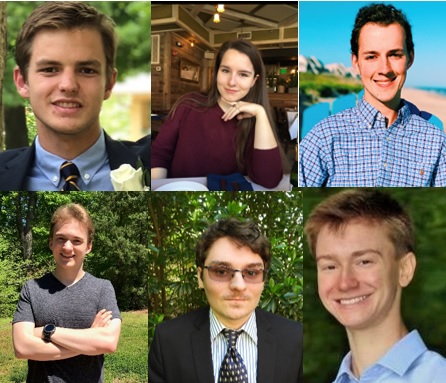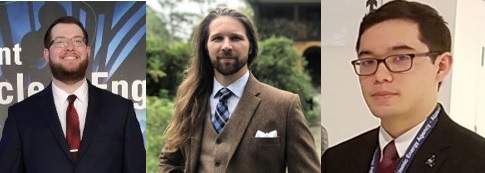Congratulations to 8 nuclear engineering (NE) students and 1 mechanical engineering (MAE) student, recipients of the 2020-21 U.S. Department of Energy Nuclear Energy University Program awards. In total, 42 scholarships and 34 fellowships at 32 U.S. colleges and universities were awarded.
NC State scholarship recipients include,
Julian Colvin (rising NE sophomore)
Hometown: Louisville, KY
Sarah Ebert (rising NE senior)
Hometown: Carlisle, PA
Matthew Field (rising NE junior)
Hometown: Cary, NC
Noah Higgins (rising NE senior)
Hometown: Clemmons, NC
Daniel Nevius (rising NE sophomore)
Hometown: Pittsboro, NC
Austin Selley (rising MAE senior)
Hometown: Greensboro, NC
NC State nuclear engineering fellowship recipients include,
Kai Duemmler
Hometown: Indian Trail, NC
Faculty Adviser: Dr. Djamel Kaoumi
His research focuses on martensitic steels for cladding applications in lead-bismuth eutectic reactors, understanding the combined effect of a corrosive environment (LBE) and irradiation field combined. The goal is to comprehend the microscopic behavior to explain macroscopic changes.
Nicholas Sponsel
Hometown: Wilmington, NC
Faculty Adviser: Dr. Katharina Stapelmann
His research focuses on the characteristics of liquid-plasma interfaces, specifically plasma generated within bubbles. This research is aimed at both altering liquid water chemistry and developing molten salt diagnostics. Combining plasma/bubble ionization with optical spectroscopy allows for noninvasive measurements of molten material content characterization.
Cole Takasugi
Hometown: Wilder, ID
Faculty Adviser: Dr. Kostadin Ivanov
His research focuses on detailed characterization and safety analysis of light water reactors using multi-physics simulation platforms. By considering the uncertainties propagated in the coupled code, and applying best estimate plus uncertainty methodology, these multi-physics simulation platforms may provide detailed knowledge of local safety parameters and enhanced safety margins for nuclear reactors.
“The Integrated University Program is focused on attracting the best and the brightest to nuclear energy professions,” said Dr. Rita Baranwal, Assistant Secretary for Nuclear Energy. “We are continuing that effort through these awards to students who will help carry nuclear energy forward, while also enhancing educational institutions’ capabilities to perform cutting-edge research, and supporting the need for qualified personnel to develop and maintain the nation’s nuclear power technology.”
Since 2009, DOE has awarded close to 800 scholarships and fellowships totaling approximately $44 million to students pursuing nuclear energy-related degrees. Ninety-three percent of students who have completed nuclear energy-related fellowships have either continued to advance their education in nuclear energy or have obtained careers at DOE’s national laboratories, other government agencies, academic institutions, or private companies. Nine former fellowship winners are now university professors engaged in nuclear energy-related research, and one was competitively awarded an Office of Nuclear Energy research and development award in 2019.

